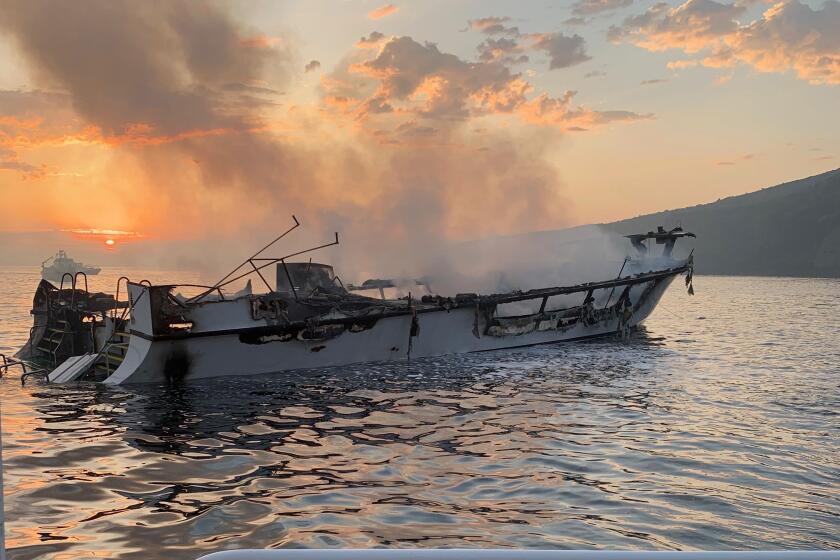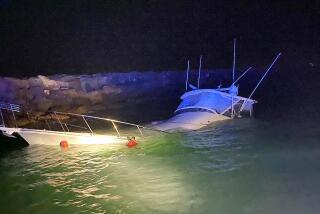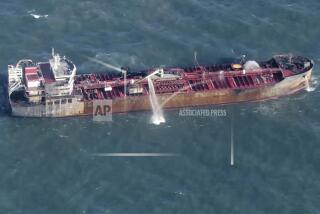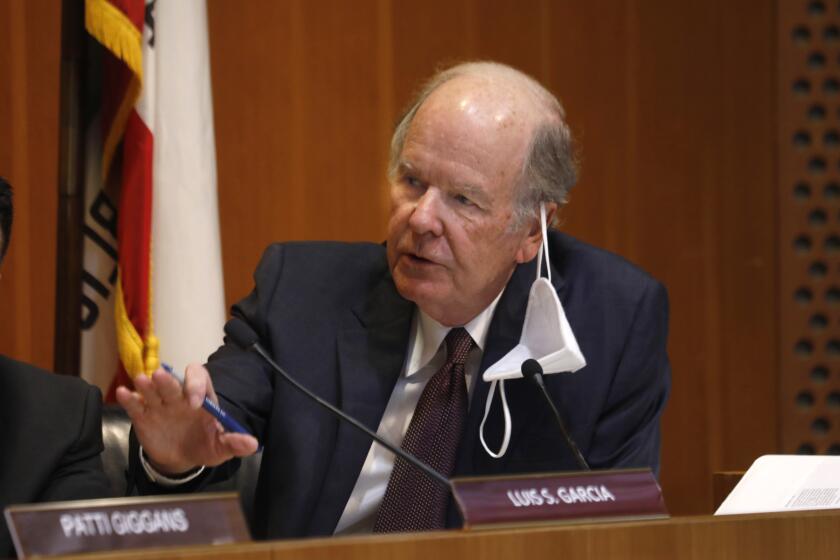Trial opens for captain of dive boat where 34 died. Was he criminally negligent?
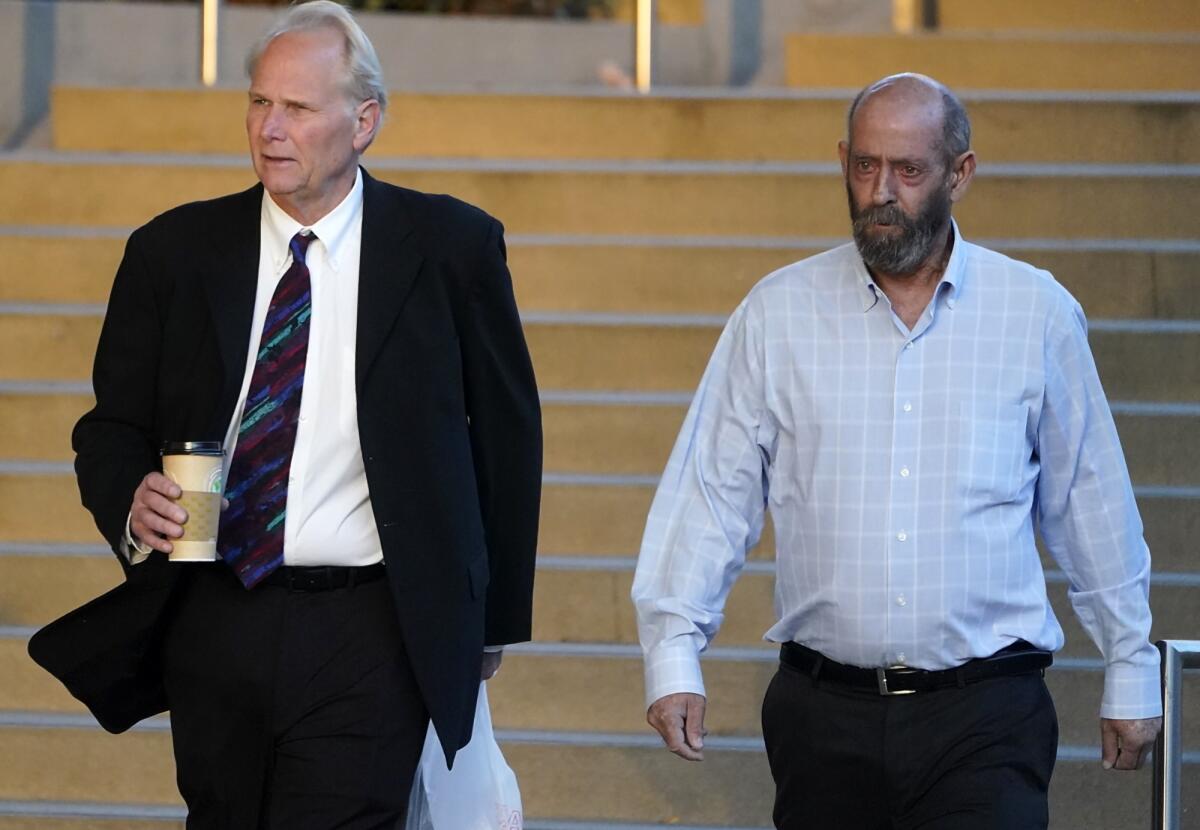
- Share via
Four years after a fire killed 34 people in a dive boat off the coast of Santa Barbara, the boat’s captain is on trial to determine whether he is criminally responsible for their deaths.
Jerry Boylan was negligent when he failed to institute a roving night watch or conduct proper fire drills aboard the Conception before it caught fire in the deadliest maritime disaster in recent U.S. history, prosecutors say.
A panel of 12 jurors and three alternates was selected and sworn in Wednesday in U.S. District Court in Los Angeles. Boylan faces one count of neglect or misconduct by a ship officer, and has pleaded not guilty.
“He’s been able to live his life while all the families cannot,” said Kathleen McIlvain, whose son Charles, 44, was killed in the fire on the 75-foot commercial diving vessel. A federal judge has ruled that prosecutors cannot refer to those killed as “victims,” deepening the anger among surviving families.
The boat was anchored off the Channel Islands on Sept. 2, 2019, on the final day of a three-day trip. Around 3 a.m., a fire of unknown origin began spreading on deck. Flames blocked both exits of the bunk room below deck, where 33 passengers and one crew member found themselves trapped.
Federal prosecutors allege Boylan failed to follow well-established safety protocols.
Prosecutors alleged the captain failed to set a roving patrol, failed to conduct fire drills and failed to sufficiently train his crew.
In his opening statement Wednesday, Asst. U.S. Atty. Matthew O’Brien told jurors that Boylan, as captain of the Conception, was responsible for the safety of the passengers and crew.
But as the fire spread, “he was the first person to jump off that boat,” and he instructed other crew members to do the same rather than fight the fire, the prosecutor said.
The 34 people who died “didn’t have a chance to jump overboard,” O’Brien said, while Boylan, who was 65 at the time, escaped without so much as a burn. “They were waiting to be rescued but nobody rescued them.”
The Conception dive boat was traveling in the waters off the Channel Islands, and in such a remote area “sailors are their own fire department and their captain is the fire chief,” the prosecutor said.
Nevertheless, he added, Boylan did not instruct any crew member to stay awake as a so-called “roving patrol” while passengers slept, even though the boat’s Certificate of Inspection spelled out the requirement in capital letters and hung on the wall behind the captain’s chair.
On board were fire extinguishers, a fire ax, and sturdy 50-foot water hoses that could have pumped unlimited seawater on the blaze, though Boylan did not train his crew in how to use the equipment. “Some of them didn’t know how to use the equipment or even where it was located,” O’Brien told jurors.
Everyone was asleep when the fire somehow started around 3 a.m., and a galley hand woke up to see an orange glow.
Boylan called a mayday at 3:14 a.m., gasping out, “I can’t breathe.”
But then “instead of trying to fight the fire, defendant jumped overboard from the upper deck straight into the ocean, abandoning his passengers and crew,” O’Brien said.
O’Brien said jurors would see a 24-second video filmed by one of the passengers trapped below deck in “the dark, cramped bunk room” as smoke spread.
It was found on a phone in the coat pocket of a dead passenger. It was taken at 3:17 a.m., three minutes after Boylan’s mayday call.
“The people didn’t know it, but their captain had already jumped overboard,” O’Brien told jurors.
Some of the victims sought safety by hunkering low to the floor. Some stayed against the wall. “They were hugging each other when they died,” O’Brien said.
Boylan was a licensed captain for 34 years, but the crew assembled for the Labor Day weekend dive was not used to working together, and when they awoke to the fire “they had no idea what to do,” O’Brien said.
Federal public defender Georgina Wakefield, in her opening statement, told jurors that the flames on the boat were 15 feet high and that Boylan did not abandon ship but radioed for help “even as flames surrounded the wheelhouse.”
After jumping into the ocean, she said, Boylan and two of his crew reboarded the boat, but conditions made it impossible to help.
“The fire hoses are on fire,” she said. “No amount of training can help you hold a fire hose that’s on fire.”
Wakefield cast blame on Truth Aquatics owner Glen Fritzler, saying he did not pay for fire training or require a crew member to keep night watch while passengers slept.
For decades, Wakefield said, Boylan had followed procedures laid out by Fritzler and was drilled to follow “the Fritzler way,” the defense attorney said, adding: “No Fritzler boat had a roving patrol.”
The defense attorney said that Boylan “didn’t know he was putting anyone in harm’s way.”
It was the boat owner’s duty to make sure regulations were followed, the defense attorney said, “not the captain, who comes in, makes his day rate, and goes out to sea.”
Earlier, Santa Barbara County officials maintained that the fire victims likely died unaware of the encroaching flames. But an investigation by the National Transportation Safety Board revealed that many of those trapped below deck were awake — some wearing shoes — as the fire engulfed the vessel. Cellphone videos later recovered by FBI forensics experts showed frantic passengers trying to escape as smoke filled the bunk room.
The NTSB, which has recommended stricter safety measures as a result of the Conception fire, concluded that the lack of a roving patrol led directly to the high number of fatalities.
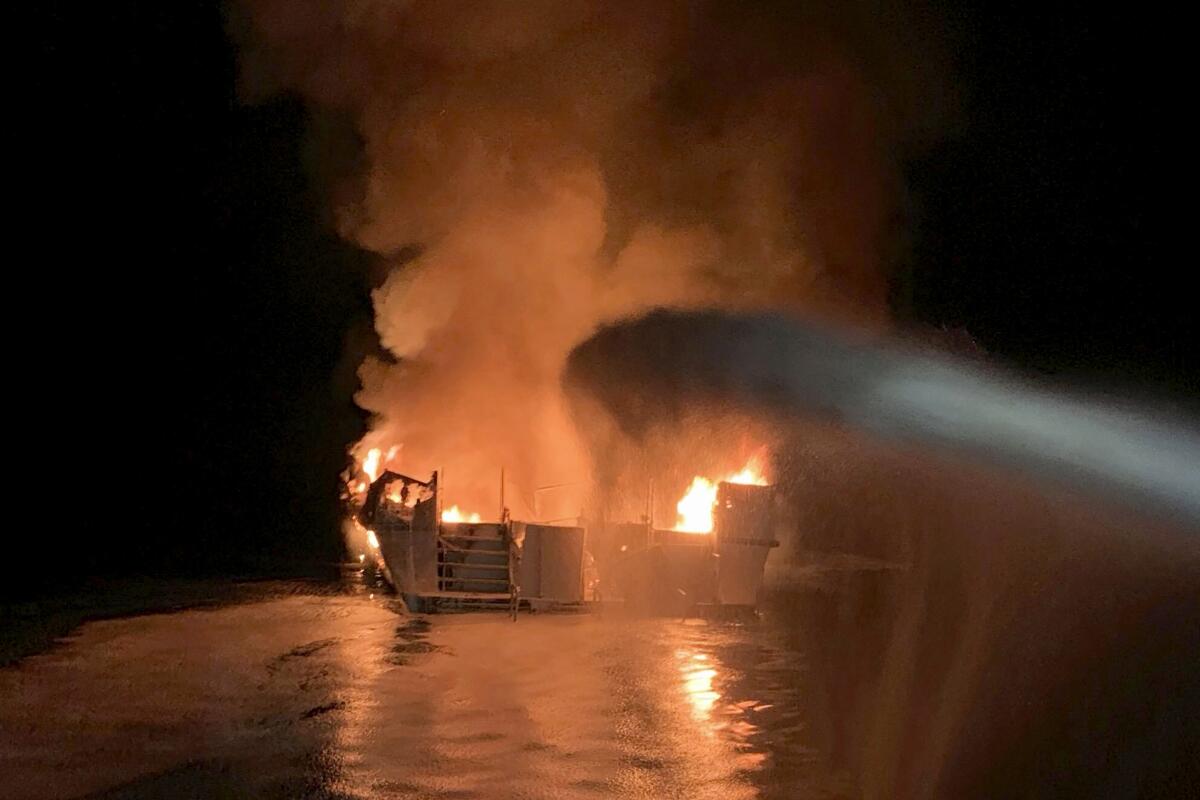
“The crew was not able to warn passengers or aid in their escape,” an NTSB report said. “Had a crew member been awake and actively patrolling the Conception on the morning of the fire, it is likely that they would have discovered the fire at an early stage, allowing time to fight the fire and give warning to the passengers and crew to evacuate.”
The NTSB concluded that Truth Aquatics had “provided ineffective oversight of its vessels’ operations,” thereby putting crew and passengers in danger. Fritzler, who has denied wrongdoing, faced a barrage of lawsuits from the relatives of dead passengers but no criminal charges.
Investigative records released Wednesday provide the fullest account yet of the 2019 boat fire off the Ventura County coast that killed 34 people, but they still do not pinpoint a cause of the fire.
The cause of the fire remains officially undetermined. Early on, speculation focused on a middle deck area where divers plugged in phones, batteries and other lithium-powered electronic devices. But a confidential report, obtained by The Times from the Bureau of Alcohol, Tobacco, Firearms and Explosives, said the blaze began in a plastic trash can on the main deck. ATF investigators based that finding on a series of burn tests at its Maryland lab and the accounts of crew members.
Boylan’s prosecution has repeatedly run into problems. He was initially indicted by a grand jury in 2020 on 34 counts of so-called “seaman’s manslaughter,” a steamship-era law that holds captains responsible for lives lost on their vessels. Each count carried a potential 10 years in prison.
Boylan’s defense argued the fire was a single incident, not separate crimes, prompting prosecutors to seek a superseding indictment on one count of seaman’s manslaughter. Last year, however, U.S. District Judge George H. Wu threw out the indictment, finding it did not specify the necessary criterion that Boylan acted with gross negligence.
A month later, a grand jury indicted Boylan on a single count that specified “gross negligence.” Boylan could face 10 years behind bars if convicted.
More to Read
Sign up for Essential California
The most important California stories and recommendations in your inbox every morning.
You may occasionally receive promotional content from the Los Angeles Times.
